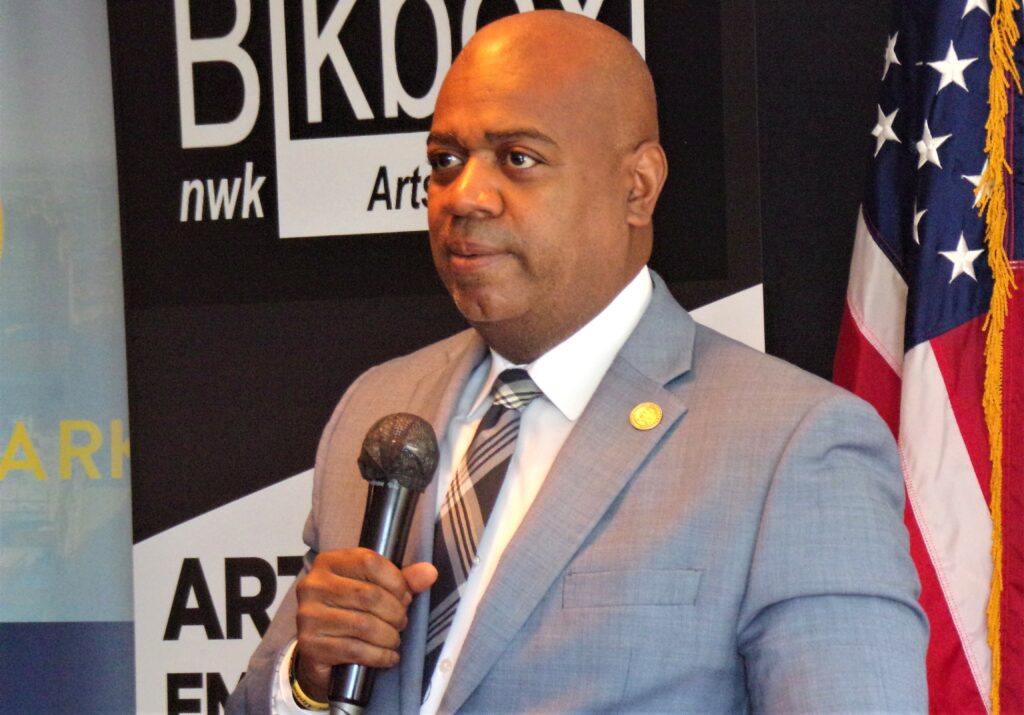MAYOR BARAKA TESTIFIES IN WASHINGTON, D.C. ON IMPLEMENTATION OF NEWARK’S LEAD SERVICE LINE REPLACEMENT PROGRAM

MAYOR BARAKA TESTIFIES IN WASHINGTON, D.C. ON IMPLEMENTATION OF NEWARK’S LEAD SERVICE LINE REPLACEMENT PROGRAM
Senate Committee on Environment and Public Works – Subcommittee on Fisheries, Water, and Wildlife holds hearing
on the Drinking Water and Wastewater Infrastructure Act of 2021 and the bipartisan Infrastructure Investment and Jobs Act;
Water and Sewer Utilities Director Kareem Adeem testified last week before the Congressional Subcommittee on Environment and Climate
Newark, NJ – April 5, 2022 — Mayor Ras J. Baraka today testified in Washington, D.C. to the Senate Subcommittee on Fisheries, Water, and Wildlife during the Drinking Water and Wastewater Infrastructure Act: Stakeholders’ needs and experiences hearing, where he shared how the bipartisan Infrastructure Investment and Jobs Act would help disadvantaged and environmental justice challenged communities. In addition, Mayor Baraka discussed how Newark became a national model for successful lead service line replacement by replacing more than 23,000 such lines in less than three years, at no cost to taxpayers. Last week, Water and Sewer Utilities Director Kareem Adeem testified before the Congressional Subcommittee on Environment and Climate about Newark’s lead line replacement program.
In his remarks, Mayor Baraka addressed a wide array of topics connected with the project, including its major health and wellness impact on the lives of residents, its creation of jobs, the efficiency with which major private and public city, county, and state stakeholders united to address the issue, and how the work was accomplished at no expense to taxpayers. In a recent visit to Newark, Vice President Kamala Harris proclaimed the project “a national model” for the nation.
“Newark’s Lead Service Line project is unprecedented in terms of scope and speed and has protected the health and wellness of the residents of Newark as well as portions of neighboring cities that we service,” said Mayor Baraka. “I am happy to attest that Newark’s lead service line replacement program, one of our city’s largest infrastructure projects has successfully replaced over 23,000 lead lines in three years when experts said it would take 10 years. This project helped protect the health and wellness of our residents and provided 500 good-paying local jobs. Workers on the project worked tirelessly to get this accomplished (even through the pandemic) to help safely complete the project. We identified affirmative action goals to establish fair access to employment opportunities and created a program designed to reflect the demographics of the city. In doing so, the program not only was of economic benefit to the City of Newark, but also the State of New Jersey.
“Our city replaced all the lead lines at no cost in capital outlay, taxes, or water rate hikes to our residents or customers in surrounding towns. This was critically important to ensure that everyone in our city had access to clean water. It is my hope that through the Implementation of the Drinking Water and Wastewater Infrastructure Act, we can increase grants and State Revolving Fund (SRF) loans for communities,” he added. “I want to thank Senator Booker, Chairman Duckworth, Ranking Member Lummis, and the entire subcommittee for convening this hearing and inviting me to speak on these issues.”
The Mayor also discussed the “best practices” learned from the project, its funding, addressing lead in schools, and supporting the needs of low-income water customers.
To view Mayor Baraka’s entire testimony, including the questions he answered, click here.
In addition, Water and Sewer Utilities Director Kareem Adeem testified last week before the Congressional Subcommittee on Environment and Climate on this matter, addressing the importance of Council ordinances that enabled the City to replace lead lines without property owners’ consent, the hiring of female- and minority-owned businesses on the projects, and how the project provided apprenticeship training for residents entering the workforce.
“Our project was a deep investment in the community from the creation of immediate jobs to the long-term prospectus of attracting more businesses and development because of our political will to deliver pure water and a cleaner environment,” he stated.
Director Adeem also shared the “necessary components” cities must put in place, so tax dollars are not wasted on similar projects.
“First, since in most cases lead service lines are the property of the homeowner, we had to ask our state legislature to pass a law allowing us to use public funds on private property for the purpose of replacing lead service lines,” he added. “It was an honor to be invited by Representatives Paul Tonko of New York and Frank Pallone of New Jersey to share our story.”
To view Director Adeem’s entire testimony, including the questions he answered, click here.
-NEWARK-
For more information on the City of Newark, please visit our website at www.newarknj.gov










